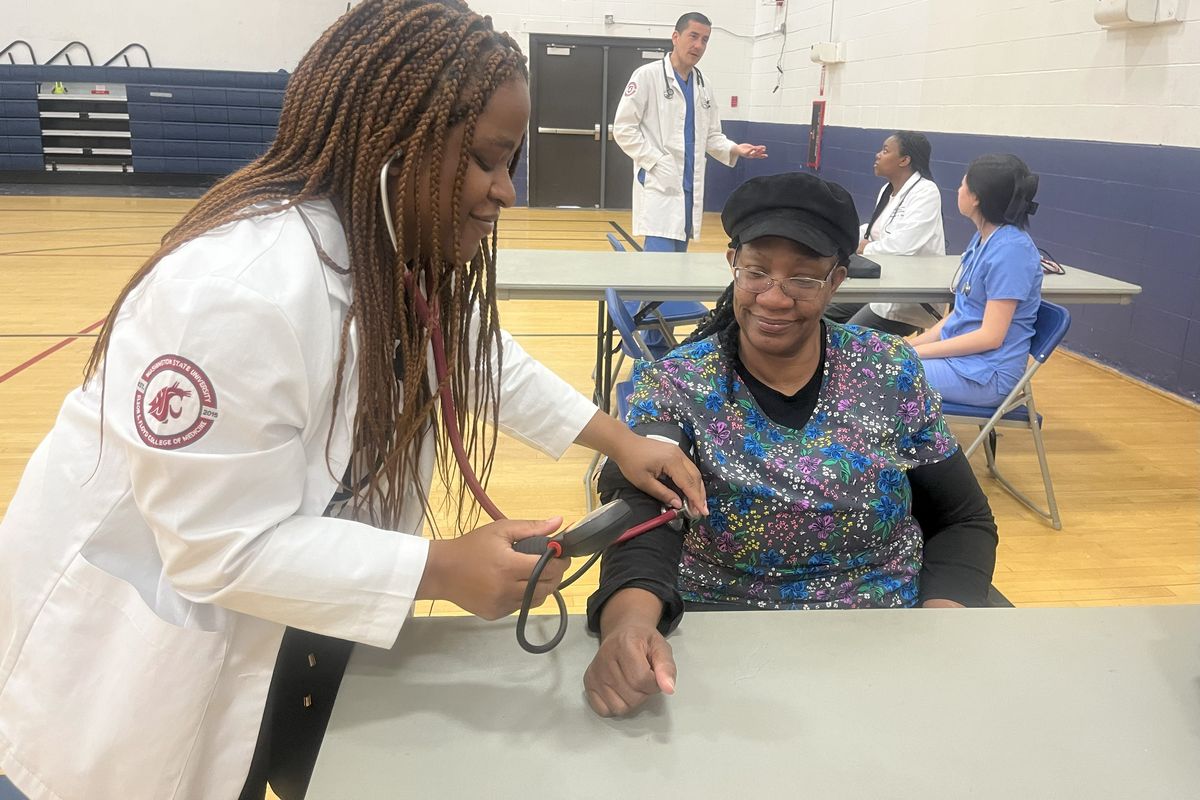On Saturday, June 22, the National Panhellenic Council, comprised
of nine historically Black Greek letter organizations, also known within the
culture to many as the Divine Nine, sponsored a Body and Soul
Health Fair at the Dr. Martin Luther King Community Center.
The event took place from 11 a.m. to 1:30 p.m. with the purpose of promoting and understanding the connection between mind, body, and soul within the Black community.
The planning committee for this event was Dr. Jeanne Baynes (Delta Sigma Theta Sorority, Inc.), Dr. Charina Carothers (Zeta Phi Beta Sorority, Inc.), Dr. Shari Clarke (Alpha Kappa Alpha Sorority, Inc.)., and Dr. Dunni Oluwoye (Sigma Gamma Rho Sorority, Inc.). Participants received Information on healthy eating, wellness resources, healthy snacks, and goody bags
were provided. Wrist blood pressure monitors and first aid kits were distributed. Dr. Claudine Richardson (of Washington state Department of Health) conducted an environmental health
disparities session, with a gift card incentive for attendees who were interested in participating. Several other organizations were present to provide resources and awareness. Free health
screenings were done by WSU medical students; Black medical and counseling professionals as well as community resource information tables were present.
Faith Washington understands the importance of representation in the medical professions. A nurse herself, she provided information about various nursing program options in Spokane. “I am promoting nursing in the community because most of the baby boomers who are nurses are retiring and there is a shortage in Spokane,” she said. At her table, anyone interested in nursing programs in Spokane could learn more. Among the schools represented were Washington State University, Eastern Washington University, the Community Colleges of Spokane, and Gonzaga University. “I have applications for anyone who wants to have a career in nursing,” she said. “That’s my focus today.”
When asked why it is so important to have Black people in the field of nursing, Washington shared the importance of advocacy for all patients: “There is an unconscious bias towards our black and brown patients, especially if they speak a different language or have a disability.”
She continued to explain that when there are patients, for instance, with a hearing impairment or a speech impediment, or other disabilities, there is a duty to provide support to mitigate confusion. Nurses are foundational in this.“I think it’s important for us all, especially nurses, to be patient advocates for those who may be misunderstood, misrepresented, or have a hard time understanding the medical jargon that comes from the medical profession,” she said.
Dr. Jeanne Baynes shared the Body and Soul Health Fair is an educational and interactive Experience. “There is healing power in community and building relationships,” Baynes said. “Juneteenth has commissioned us to build a strong and healthy community for generations to come. A community empowers us to be seen, heard, valued and respected. A healthy community impacts the quality of life for its members.”
Other organizations and professionals represented at the event were Anna Franklin, Chief Diversity Officer of Providence, member of the Links, Inc., Spokane Chapter and founder of Maji Rising, Dr. Tanisha Morton, pediatrician and member of Delta Sigma Theta Sorority,
Incorporated. The Navigator: Services for Family Mental Health Crisis, and Aging and Long-Term Services (ALTSA) were also present to offer information and resources.
Dr. Clarke said that health care, and body/soul support are matters of priority because we need to not only take care of ourselves physically, but we also need to consider how we take care of ourselves emotionally and mentally. She mentions socioeconomics and psychological awareness as correlating factors to our overall health. “It’s so important that we come together,”
Clarke said. “We have always been a community that came together, that’s rallied together mto support one another. From pre-slavery, to slavery, to times on, we’ve always come together to support one another, to be there for one another.”
As she reflected at the close of the fair, Clarke shared that it was a good event. “A lot of learning, a lot of opportunities for fellowship, to network with one another, and of course, to get good information … and to learn how to take care of ourselves,” she said. “If you don’t take care of yourself, you don’t really have anything else. It’s most important that you take
care of yourself first, which enables you to take care of your family and friends.” The Dr. Martin Luther King, Jr. Community Center has been a home base of support in the Black community in Spokane for decades. Executive Director Freda Gandy shared, “I think today is so important because, first of all, a lot of fraternities and sororities came together to put on this health fair. The MLK Center served, as it does every day, as a resource hub. Hosting
it here just made perfect sense, and I think it’s important to do events like this so that we can educate our community, our Black community, and the community as a whole, about access to healthcare, how to take care of us and our bodies, and how we can live long, sustainable lives
as well.”
